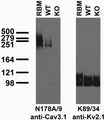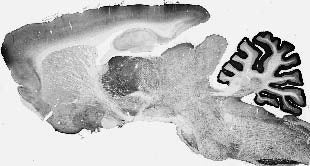Ships: 1-2 business days
Product Specific References for Applications and Species
- Immunohistochemistry: Human | Mouse | Non-Human Primate | Rat
- Western Blot: Mouse
- Additional Publications: Unspecified
| Immunohistochemistry: Human | ||
| PMID | Dilution | Publication |
| 24107939 | 1:8(supe) | Puthussery, T., et al. 2013. NaV1. 1 channels in axon initial segments of bipolar cells augment input to magnocellular visual pathways in the primate retina. . Journal of Neuroscience, 16045-16059. |
| Immunohistochemistry: Mouse | ||
| PMID | Dilution | Publication |
| 32675279 | 1:500 | Lipiec, M.A., et al. 2020. TCF7L2 regulates postmitotic differentiation programmes and excitability patterns in the thalamus. Development, . |
| 31859031 | 1:150 | Stoyas, C.A., et al. 2020. Nicotinamide Pathway-Dependent Sirt1 Activation Restores Calcium Homeostasis to Achieve Neuroprotection in Spinocerebellar Ataxia Type 7. Neuron, 630-644. |
| Immunohistochemistry: Non-Human Primate | ||
| PMID | Dilution | Publication |
| 33188005 | 1:10 (supe) | McLaughlin, A.J., et al. 2021. Glycinergic Inhibition Targets Specific Off Cone Bipolar Cells in Primate Retina. eNeuro, . |
| 26538609 | 1:1000 | Devergnas, A., et al. 2016. Anatomical localization of Cav3.1 calcium channels and electrophysiological effects of T-type calcium channel blockade in the motor thalamus of MPTP-treated monkeys.. Journal of Neurophysiology, 470-485. |
| 24107939 | 1:8(supe) | Puthussery, T., et al. 2013. NaV1. 1 channels in axon initial segments of bipolar cells augment input to magnocellular visual pathways in the primate retina. . Journal of Neuroscience, 16045-16059. |
| Immunohistochemistry: Rat | ||
| PMID | Dilution | Publication |
| 32726631 | not listed | Holderith, N., et al. 2020. A High-Resolution Method for Quantitative Molecular Analysis of Functionally Characterized Individual Synapses. Cell Reports, 107968. |
| Western Blot: Mouse | ||
| PMID | Dilution | Publication |
| 33675359 | 1:1000 | Yu, D., et al. 2021. The Transcription Factor Shox2 Shapes Neuron Firing Properties and Suppresses Seizures by Regulation of Key Ion Channels in Thalamocortical Neurons.. Cerebral Cortex, 3194-3212. |
| 31910261 | not listed | Lee, M., et al. 2020. Ecm29-mediated proteasomal distribution modulates excitatory GABA responses in the developing brain. Journal of Cell Biology, e201903033. |
| 31859031 | 1ug/ml | Stoyas, C.A., et al. 2020. Nicotinamide Pathway-Dependent Sirt1 Activation Restores Calcium Homeostasis to Achieve Neuroprotection in Spinocerebellar Ataxia Type 7. Neuron, 630-644. |
| 27112236 | 1:500 | Calhoun, J.D., et al. 2016. Cacna1g is a genetic modifier of epilepsy caused by mutation of voltage-gated sodium channel Scn2a. Epilepsia, e103-107. |
| 25825486 | not listed | Curran, J., et al. 2015. Eps15 Homology Domain-containing Protein 3 Regulates Cardiac T-type Ca2+ Channel Targeting and Function in the Atria.. The Journal of Biological Chemistry, 12210-12221. |
| 22133878 | not listed | Goonasekera, S.A., et al. 2012. Decreased cardiac L-type Ca²⁺ channel activity induces hypertrophy and heart failure in mice.. Journal of Clinical Investigation, 280-290. |
| Additional Publications: Unspecified | ||
| PMID | Publication | |
| 23287412 | Valerie, N.C., et al. 2013. Inhibition of T-type calcium channels disrupts Akt signaling and promotes apoptosis in glioblastoma cells.. Biochemical Pharmacology, 888-897. | |






